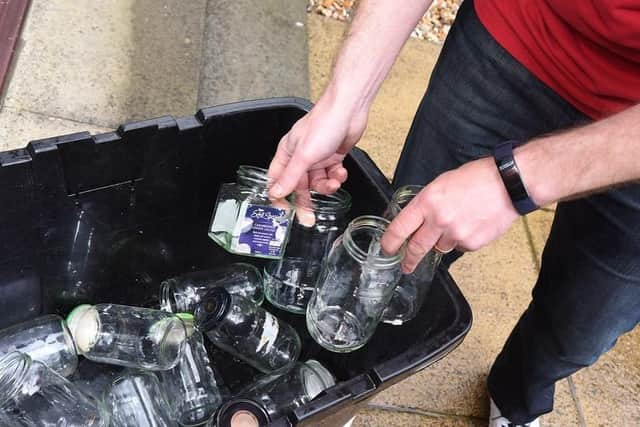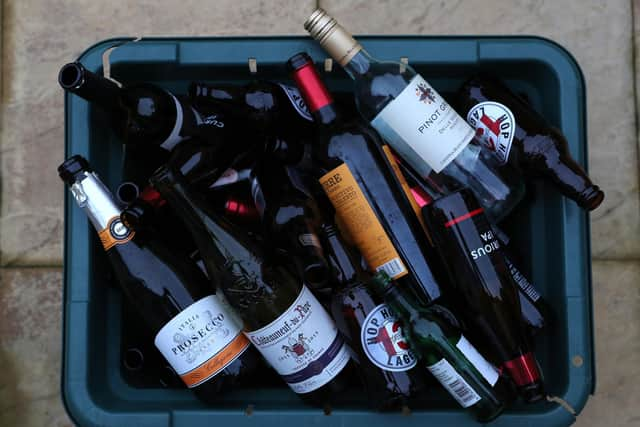Deposit return scheme Scotland: 'Outrageous' intervention or simply 'working together' - where does DRS go from here after Lorna Slater comments?
This article contains affiliate links. We may earn a small commission on items purchased through this article, but that does not affect our editorial judgement.
In Scottish politics there is one factor that is always a sure-fire thing and that is the ability of the two largest parties in Holyrood descending into constitutional outrage.
That is exactly what the debate around Scotland’s deposit return scheme has become following the intervention by the UK Government on Saturday.
Advertisement
Hide AdAdvertisement
Hide AdThat intervention saw UK Government ministers, including levelling up secretary Michael Gove, environment secretary Therese Coffey, and Scotland secretary Alister Jack, write to First Minister Humza Yousaf to tell him that for the UK Government to allow the scheme to proceed, it can only include PET plastic bottles, and aluminium and steel cans.


With similar schemes in the rest of the UK not due to come into effect until 2025, Scottish ministers had been forced to seek an exemption from the UK Internal Market Act, amid concerns trade between the four nations could be impacted.
Glass bottles are not included in the DRS plans for England and Northern Ireland. UK ministers argued having glass in the Scottish scheme could create a “permanent divergence” in the market.
Deposit return schemes – at least these versions – are designed, at heart, to shift the burden of recycling costs from the taxpayer and onto businesses, or in the parlance of the civil service, ‘producers’.
It is, inherently, a disruptive scheme. It places temporary additional costs on to the consumer – 20p per item – and significant permanent costs on to businesses forced to comply.


The balance, so the argument goes, is a lower reliance on local authorities picking up bottles and cans from outside your door, freeing up that money to be spent on other frontline services, while encouraging through that aforementioned 20p increased rates of recycling.
This isn’t limited to the Scottish scheme, it’s also the basis of the UK planned scheme.
Scottish Government insiders are quite comfortable with the industry backlash to their plans, at least in the sense they believe there would be opposition to any plans that threaten adding costs to business.
Advertisement
Hide AdAdvertisement
Hide AdPatrick Harvie, the Scottish Green co-leader, told this newspaper in late April that it was “reassuring” there was pushback for his party’s environmental policies because “it means the people with the vested interest in the status quo don’t like it”. To an extent, therefore, vocal opposition is baked into the strategy.
Industry is shouting loudest about the scheme’s impact, with many claiming it puts too much of a burden on small producers in particular, while others fume at the ‘attempted’ inclusion of glass.
But the economic impact versus environmental impact debate is not the argument either the UK Government or the Scottish Government are actually having. If it was, it is likely there would be some progress and compromise.
Much like with gender reform, this is a difference in policy played out in a vociferous, bitter constitutional battlefield. Instead the Scottish public find themselves witnessing two governments shouting over constitutional issues, grasping for their respective comfort blankets.
The key change is the removal of glass bottles from the scheme, which now has a start date of March 2024 after being delayed from this August. Glass was initially included by the UK Government and is part of proposals being considered by the Welsh, Labour-run government in Cardiff.
However, the UK Government’s decision to issue an exemption with such a caveat was labelled by Lorna Slater, the Scottish Government’s circular economy minister who is leading the work on DRS, as part of a “systematic undermining of devolution”.
She went on to say the quiet part of her Government and the pro-independence party’s strategy out loud when she said “the whole point of devolution is exactly so we can do things differently in Scotland”.
The Scottish Green MSP told the BBC’s Sunday Show: “We should absolutely be using the powers of devolution to prevent waste and litter, to tackle environmental issues and social issues. That’s what it’s for.
Advertisement
Hide AdAdvertisement
Hide Ad“Westminster is starting to block us at every turn, on equalities issues, on environmental issues. This is a disastrous way forward and is disrespectful to Scotland.”
Scottish Conservative Maurice Golden attempted to spin his Government’s role in the constitutional stooshie into one about delivery, stating Ms Slater had “tried to cover up her own inadequacies by pettily attempting to make the deposit return scheme a constitutional issue”.
He said: “The UK Government have listened to worried businesses who are calling for a UK-wide approach. The reality is the SNP-Greens have made such a mess of things that the current scheme is unrecognisable from the one envisaged four years ago.”
However, UK Government insiders are also beginning to say the quiet part out loud about their approach to devolution, pointing at the existence of the Internal Market Act, the very Bill that has caused the issues with DRS, as how devolution was intended to work.
When considering the regulations for Scottish DRS pre-date the IMA, that argument does not survive scrutiny.
After it was put to them the Scottish Government were being hamstrung by a UK Government intent on imposing its own policies on areas of devolved competence, it was stated Scottish ministers were free to operate within devolved competence, but cannot do so in a way which would have an adverse effect on the operation of the UK internal market.
That is the quiet bit of the post-Brexit, muscular unionism Conservative party strategy laid out starkly for those of a nationalist and potentially even devolutionist persuasion.Where this scheme goes from here, however, is an open question.
There is a multitude of possibilities. The DRS could go ahead in Scotland as intended by the UK Government as effectively a pilot scheme of the UK-wide version, it could be ditched altogether by the Scottish Government, who will blame the UK Government’s interventionism, or it could even end up in the courts.
Advertisement
Hide AdAdvertisement
Hide AdThe debate around the DRS has become a proxy war over the constitution, one which suits both the SNP/Green and the Conservative governments as they attempt to reignite the light of never-ending constitutional grievance despite the lack of an imminent independence referendum.
As long as it remains a constitutional debate between the two governments, however, there will be little in the way of progress.
Want to hear more from The Scotsman's politics team? Check out the latest episode of our political podcast, The Steamie.
It's available wherever you get your podcasts, including Apple Podcasts and Spotify.
Comments
Want to join the conversation? Please or to comment on this article.
